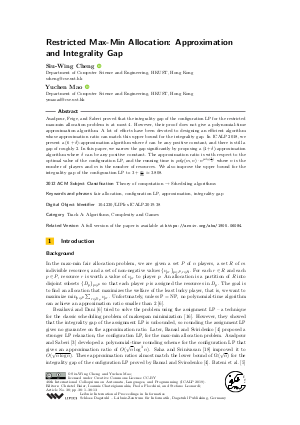Restricted Max-Min Allocation: Approximation and Integrality Gap
Authors
Siu-Wing Cheng  ,
Yuchen Mao
,
Yuchen Mao 
-
Part of:
Volume:
46th International Colloquium on Automata, Languages, and Programming (ICALP 2019)
Part of: Series: Leibniz International Proceedings in Informatics (LIPIcs)
Part of: Conference: International Colloquium on Automata, Languages, and Programming (ICALP) - License:
 Creative Commons Attribution 3.0 Unported license
Creative Commons Attribution 3.0 Unported license
- Publication Date: 2019-07-04
File

PDF
LIPIcs.ICALP.2019.38.pdf
- Filesize: 0.52 MB
- 13 pages
Document Identifiers
Related Versions
-
A full version of the paper is available at https://arxiv.org/abs/1905.06084.
Subject Classification
ACM Subject Classification
- Theory of computation → Scheduling algorithms
Keywords
- fair allocation
- configuration LP
- approximation
- integrality gap
Metrics
- Access Statistics
-
Total Accesses (updated on a weekly basis)
0PDF Downloads0Metadata Views
Abstract
Asadpour, Feige, and Saberi proved that the integrality gap of the configuration LP for the restricted max-min allocation problem is at most 4. However, their proof does not give a polynomial-time approximation algorithm. A lot of efforts have been devoted to designing an efficient algorithm whose approximation ratio can match this upper bound for the integrality gap. In ICALP 2018, we present a (6 + delta)-approximation algorithm where delta can be any positive constant, and there is still a gap of roughly 2. In this paper, we narrow the gap significantly by proposing a (4+delta)-approximation algorithm where delta can be any positive constant. The approximation ratio is with respect to the optimal value of the configuration LP, and the running time is poly(m,n)* n^{poly(1/(delta))} where n is the number of players and m is the number of resources. We also improve the upper bound for the integrality gap of the configuration LP to 3 + 21/26 =~ 3.808.
Cite As Get BibTex
Siu-Wing Cheng and Yuchen Mao. Restricted Max-Min Allocation: Approximation and Integrality Gap. In 46th International Colloquium on Automata, Languages, and Programming (ICALP 2019). Leibniz International Proceedings in Informatics (LIPIcs), Volume 132, pp. 38:1-38:13, Schloss Dagstuhl – Leibniz-Zentrum für Informatik (2019)
https://doi.org/10.4230/LIPIcs.ICALP.2019.38
BibTex
@InProceedings{cheng_et_al:LIPIcs.ICALP.2019.38,
author = {Cheng, Siu-Wing and Mao, Yuchen},
title = {{Restricted Max-Min Allocation: Approximation and Integrality Gap}},
booktitle = {46th International Colloquium on Automata, Languages, and Programming (ICALP 2019)},
pages = {38:1--38:13},
series = {Leibniz International Proceedings in Informatics (LIPIcs)},
ISBN = {978-3-95977-109-2},
ISSN = {1868-8969},
year = {2019},
volume = {132},
editor = {Baier, Christel and Chatzigiannakis, Ioannis and Flocchini, Paola and Leonardi, Stefano},
publisher = {Schloss Dagstuhl -- Leibniz-Zentrum f{\"u}r Informatik},
address = {Dagstuhl, Germany},
URL = {https://drops.dagstuhl.de/entities/document/10.4230/LIPIcs.ICALP.2019.38},
URN = {urn:nbn:de:0030-drops-106143},
doi = {10.4230/LIPIcs.ICALP.2019.38},
annote = {Keywords: fair allocation, configuration LP, approximation, integrality gap}
}
Author Details
References
-
C. Annamalai, C. Kalaitzis, and O. Svensson. Combinatorial Algorithm for Restricted Max-Min Fair Allocation. ACM Transactions on Algorithms, 13(3):37:1-37:28, 2017.

-
A. Asadpour, U. Feige, and A. Saberi. Santa Claus meets hypergraph matchings. ACM Transactions on Algorithms, 8(3):24:1-24:9, 2012.

-
A. Asadpour and A. Saberi. An approximation algorithm for max-min fair allocation of indivisible goods. In Proceedings of the 39th ACM Symposium on Theory of Computing, pages 114-121, 2007.

-
N. Bansal and M. Sviridenko. The Santa Claus problem. In Proceedings of the 38th ACM Symposium on Theory of Computing, pages 31-40, 2006.

-
M. Bateni, M. Charikar, and V. Guruswami. Max-Min Allocation via Degree Lower-bounded Arborescences. In Proceedings of the 41st Annual ACM Symposium on Theory of Computing, pages 543-552, 2009.

-
I. Bezáková and Varsha Dani. Allocating indivisible goods. SIGecom Exchanges, 5(3):11-18, 2005.

-
D. Chakrabarty, J. Chuzhoy, and S. Khanna. On Allocating Goods to Maximize Fairness. In Proceedings of the 50th IEEE Symposium on Foundations of Computer Science, pages 107-116, 2009.

- S.-W. Cheng and Y. Mao. Integrality Gap of the Configuration LP for the Restricted Max-Min Fair Allocation. CoRR, abs/1807.04152, 2018. URL: http://arxiv.org/abs/1807.04152.
-
S.-W. Cheng and Y. Mao. Restricted Max-Min Fair Allocation. In Proceedings of the 45th International Colloquium on Automata, Languages, and Programming, pages 37:1-37:13, 2018.

- S. Davies, T. Rothvoss, and Y. Zhang. A Tale of Santa Claus, Hypergraphs and Matroids. CoRR, abs/1807.07189, 2018. URL: http://arxiv.org/abs/1807.07189.
-
U. Feige. On allocations that maximize fairness. In Proceedings of the 19th ACM-SIAM Symposium on Discrete Algorithms, pages 287-293, 2008.

-
B. Haeupler, B. Saha, and A. Srinivasan. New Constructive Aspects of the Lovász Local Lemma. Journal of the ACM, 58(6):28:1-28:28, 2011.

-
P.E. Haxell. A condition for matchability in hypergraphs. Graphs and Combinatorics, 11(3):245-248, 1995.

-
J.E. Hopcroft and R.M. Karp. An n^5/2 algorithm for maximum matching in bipartitie graphs. SIAM Journal on Computing, 2:225-231, 1973.

- K. Jansen and L. Rohwedder. A note on the integrality gap of the configuration LP for restricted Santa Claus. CoRR, abs/1807.03626, 2018. URL: http://arxiv.org/abs/1807.03626.
-
J.K. Lenstra, D.B. Shmoys, and É. Tardos. Approximation Algorithms for Scheduling Unrelated Parallel Machines. In Proceedings of the 28th IEEE Symposium on Foundations of Computer Science, pages 217-224, 1987.

-
L. Polacek and O. Svensson. Quasi-polynomial Local Search for Restricted Max-Min Fair Allocation. In 39th International Colloquium on Automata, Languages, and Programming, pages 726-737, 2012.

-
B. Saha and A. Srinivasan. A New Approximation Technique for Resource-Allocation Problems. In Proceedings of the 1st Symposium on Innovations in Computer Science, pages 342-357, 2010.

